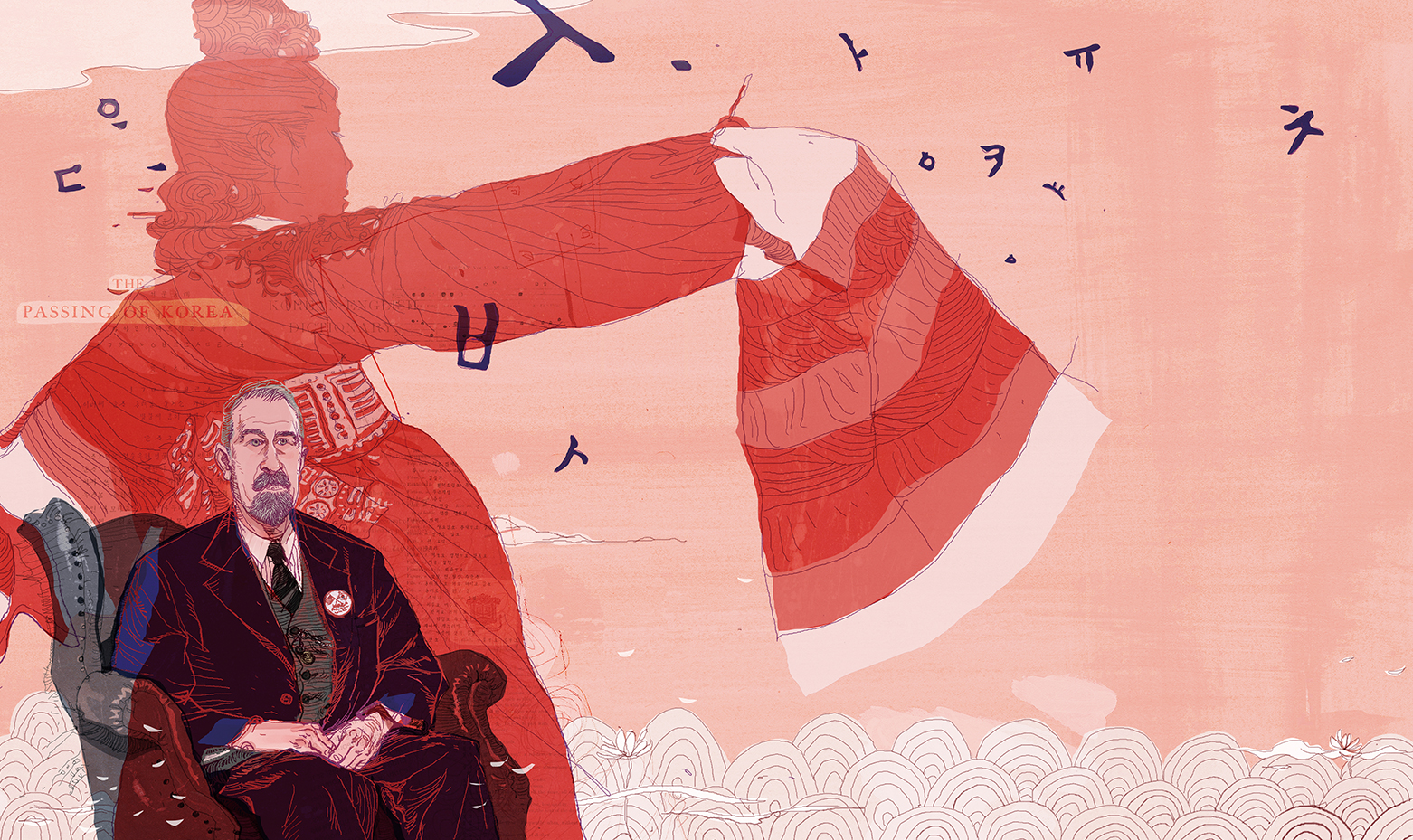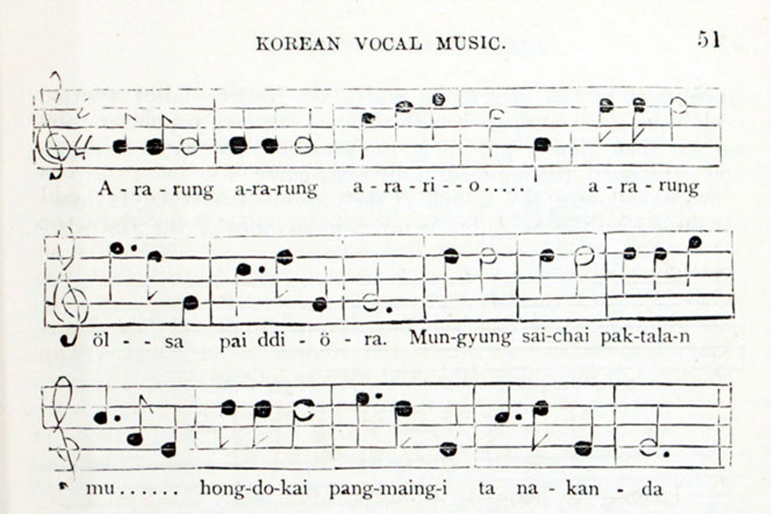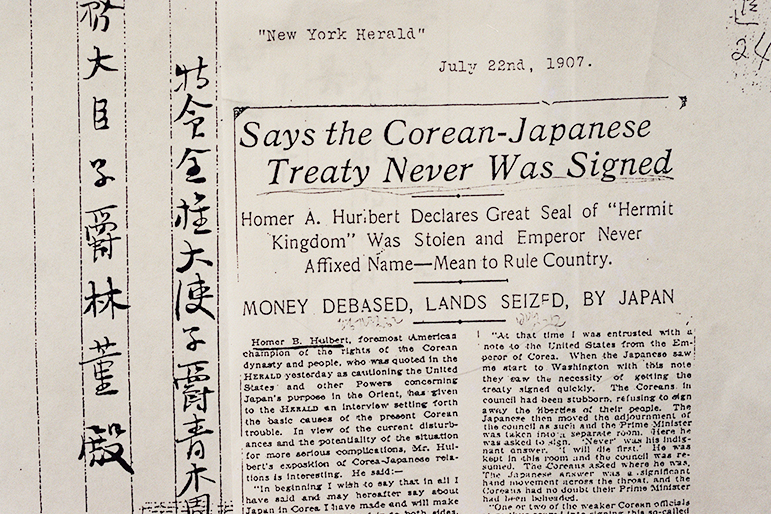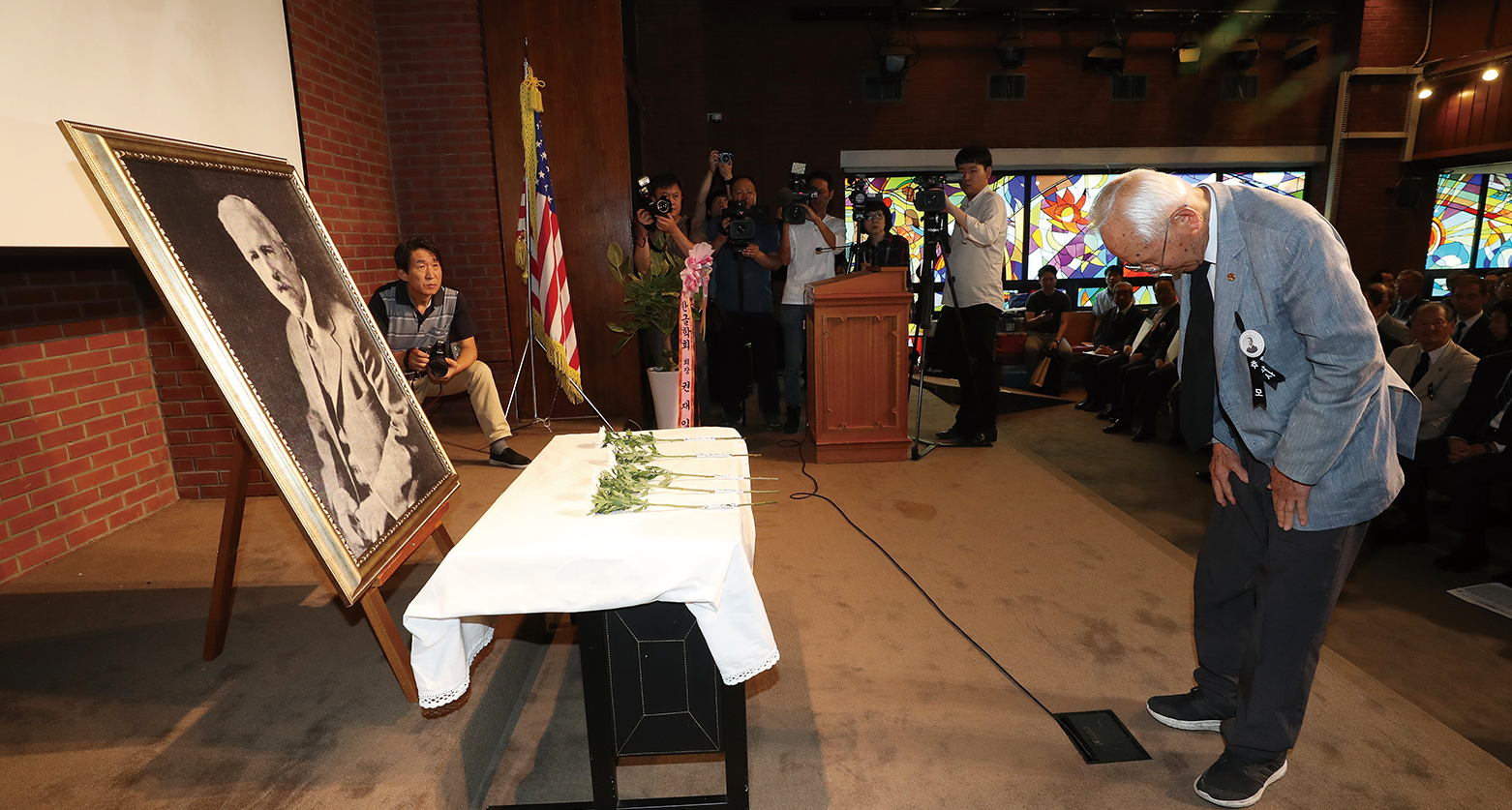
Contents










Historic Anniversary · Written by Jeon Han Illustrated by Manus Eugene Photo courtesy of Yonhap News
Loving Korea More
than Koreans
Homer Bezaleel Hulbert
In the preface to his book The Passing of Korea published in 1906, Homer Bezaleel Hulbert wrote,
“For aid in the compilation of this book, my thanks are mainly due to a host of kindly Koreans
from every class in society, from the silk-clad yangban (ruling class) to the fettered criminal in prison,
from the men who go up the mountains to monasteries to those who go down to the sea in ships.”
These words indicated his deep love for Korea and his understanding and appreciation of Korean diversity.
The American missionary, journalist and activist was a genuine Korean
whom freedom fighter Ahn Jung-geun said all Korean patriots should know about.

One who should not be forgotten by Koreans even for a single day.”
This is what freedom fighter Ahn Jung-geun, who was imprisoned in 1909 at Lushun Prison in China after assassinating Hirobumi Ito, the first Japanese resident-general of Korea, said in responding to a question from a Japanese police officer about Homer Bezaleel Hulbert (1863-1949).
Hulbert was the first foreigner to receive a public funeral in Korea in 1949 and earn the Order of Merit for National Foundation, which was awarded to him posthumously the following year. Reflecting on his legacy and the traces he left behind, it is no wonder why many independence fighters revered the American and why he was dubbed the “person who loved Korea more than Koreans.”

Learning About Korea and Hangeul
Hulbert began his relationship with Korea as a teacher at the Royal English School in 1886. Learning the Korean language and Hangeul immediately after arriving in Joseon for missionary work and education, he provided support from 1890 for the compilation of A Concise Dictionary of the Korean Language along with British American pastor and educator Horace Grant Underwood (1859-1916) and Canadian missionary and educator James Scarth Gale (1863-1937).
Hulbert’s affection for Korea grew through learning the Korean language, and he expressed his fondness for the country through his books and theses. Having published a world geography book in Korean in 1891, he publicized the excellence of Hangeul in his paper “The Korean Alphabet,” which was published in the first issue of The Korean Repository, the first English-language monthly magazine in Korea, in January 1892. He also submitted an article explaining how Hangeul was invented in the magazine’s March issue of the same year, and another on idu, a writing system that represented the Korean language through the sounds and translations of Chinese characters, in the February 1898 issue.
Returning to the U.S. in 1891 and coming back to Korea with his family in 1893, Hulbert devoted himself to writing about Korea in general including its culture, society and history and about missionary work through numerous documents. He took over Sammun Publishing Co. in 1893 and resumed the suspended publication of The Korean Repository. Aside from publishing English-language magazines and books on missionary work, Hulbert was the de facto editor in providing relevant knowledge and printing equipment when Seo Jae-pil (1864-1951) began publishing the daily The Independent in April 1896.
 Arirang was carried into Western music by Dr. Homer Hulbert. Dr. Hulbert published the score for “Munkyung Saejae Arirang” in Korea’s first-ever English newsletter, “The Korean Repository.”
Arirang was carried into Western music by Dr. Homer Hulbert. Dr. Hulbert published the score for “Munkyung Saejae Arirang” in Korea’s first-ever English newsletter, “The Korean Repository.” This photo shows a copy of the interview with Dr. Homer Hulbert, the foreign policy adviser of Emperor Gojong, who announced that Emperor Gojong had not signed the Japan-Korea Treaty of 1905 and that the Royal Seal had been stolen. The interview announcing this injustice was published in the “New York Herald” on July 22, 1907.
This photo shows a copy of the interview with Dr. Homer Hulbert, the foreign policy adviser of Emperor Gojong, who announced that Emperor Gojong had not signed the Japan-Korea Treaty of 1905 and that the Royal Seal had been stolen. The interview announcing this injustice was published in the “New York Herald” on July 22, 1907.Secret Envoy of Korean Empire
Hulbert used to guard the bedroom of Emperor Gojong nightly along with Underwood after the Eulmi Incident, which saw Miura Goro, the Japanese minister to Korea, take the lead in assassinating Empress Myeongseong on Oct. 8, 1895. Armed with a pistol, Hulbert escorted Gojong at the time of the Chunsaengmun Incident, in which the emperor, who was under constant threat, tried in vain to go to the American legation in Korea with the help of pro-Americans on Nov. 27, 1895.
As Japan began acting on its ambition to colonize the Korean Peninsula, Hulbert in 1905 pleaded with Gojong to take action. Eventually, the emperor gave the American a confidential letter underscoring the Korea-U.S. friendship, clarifying Japan’s acts of aggression and the corresponding injustice, and asking for America’s help. Hulbert tried everything but ultimately failed to deliver the letter to U.S. President Theodore Roosevelt (1858-1919).
After the conclusion of the Eulsa Treaty, which forcibly deprived Korea of its diplomatic sovereignty in November 1905, Hulbert denounced the agreement by stating, “The U.S. handed Korea to Japan.”
Failing to deliver Gojong’s letter and seeing how imperial Japan distorted news about Joseon, Hulbert concentrated on publicizing Korea by publishing in 1906 The Passing of Korea, which covered many aspects of the country including its geography and background, race, political system, history, industry, culture, arts, social systems, modernization and future.
When the International Peace Conference opened in The Hague in 1907, Hulbert was dispatched as the emperor’s secret envoy to publicize Japan’s atrocities and greed to the representatives of each country.

The ceremony for the 69th anniversary of Dr. Homer Hulbert’s death was held at the Yanghwajin Foreign Missionary Cemetery in Mapo-gu, Seoul on August 10. Independence patriot Lim Woo-chul bows his head in a silent tribute after his floral offering.
Unprecedented Honors for Non-Korean
Hulbert continued his activities for Joseon, and this ultimately prevented his return to the peninsula because of Japan. He lashed out at U.S. policy toward Korea in his contribution “American Policy in the Case of Korea and Belgium” in the March 5 edition of The New York Times in 1916, and exposed Japan’s cruelty in Korea through his statement titled “What About Korea” to the U.S. Senate in August 1919 after the March First Independence Movement on March 1 of the same year.
Attending the so-called Korean Freedom Congress in Washington in 1942, Hulbert testified that Japan forcibly colonized Joseon, saying, “Emperor Gojong had always been bullied but never gave up the country.”
Hulbert’s activities for Korean independence continued until national liberation in 1945. At age 86, he came back to Korea on July 29, 1949, under the invitation of President Syngman Rhee. Before passing away on Aug. 5, 1949, only a week after returning to Korea, Hulbert left a will reading, “I would rather be buried in Korea than in Westminster Abbey.” He was laid to rest at the Yanhwajin Foreign Missionary Cemetery after his public funeral.
Hulbert’s son William, in a contribution sent in 1973 to commemorate the Korean-language publication of his father’s book, conveyed his dad’s everlasting love for Korea, stating, “My father never gave up hope that even after 40 years, Korea would be liberated from Japan and would be a free and independent country after World War II,” adding, “(In seeing the peninsula’s division), I am certain that my father’s hope for a unified Korea would overcome such adversities as this and that he believed that they would build a glorious and dazzling future.”
Other Articles















